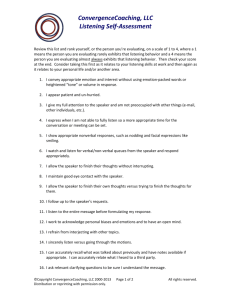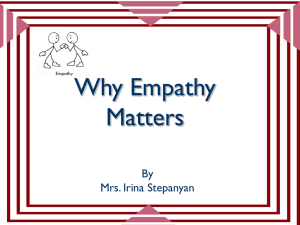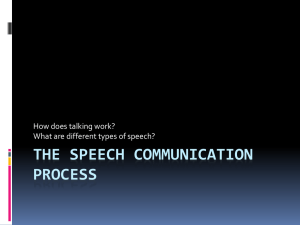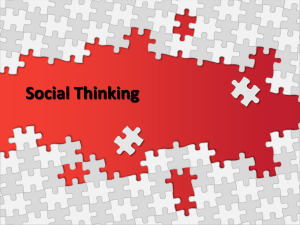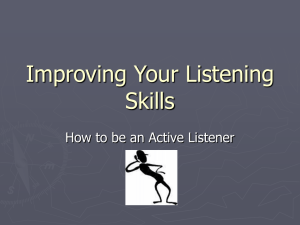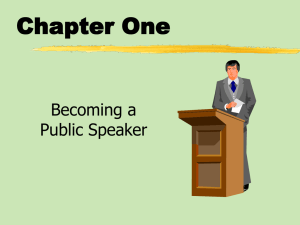Empathic Listening and Communication Skills
advertisement
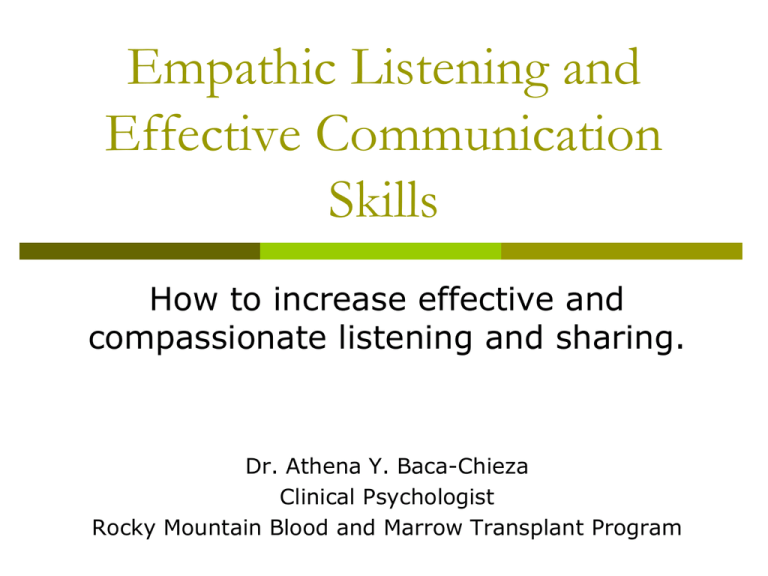
Empathic Listening and Effective Communication Skills How to increase effective and compassionate listening and sharing. Dr. Athena Y. Baca-Chieza Clinical Psychologist Rocky Mountain Blood and Marrow Transplant Program Your Role as a Buddy is Priceless! “Buddies are there to listen, offer support, and share their experience.” You are buddies because each of you have walked down the same road as the peers with whom you have been connected. You are able to connect with these people in a way that most professional caregivers are unable to do. How can you offer support and honor the unique experience of every buddy, while using your personal experience to guide you? You Can by engaging in: EMPATHIC LISTENING and EFFECTIVE COMMUNICATION!!! Empathic Listening & Effective Communication Empathic listening (also called active listening or reflective listening) is a way of listening and responding to another person that improves mutual understanding and trust. It enables the listener to receive and accurately interpret the speaker's message, and then provide an appropriate response. Empathic Listening & Effective Communication Through empathic listening the listener lets the speaker know, "I understand your problem and how you feel about it, I am interested in what you are saying and I am not judging you." The listener unmistakably conveys this message through words and non-verbal behaviors, including body language. In so doing, the listener encourages the speaker to fully express herself or himself free of interruption, criticism or being told what to do. Role Play Buddy-Athena Patient-Jeannie Take note of the interaction. What do you notice? Guidelines for Empathic Listening and Effective Communication Be attentive. Be interested. Be alert and not distracted. Create a positive atmosphere through nonverbal behavior. Be a sounding board -- allow the speaker to bounce ideas and feelings off you while assuming a nonjudgmental, non-critical manner. Guidelines (cont.) Don't ask a lot of questions. They can give the impression you are "grilling" the speaker. Act like a mirror -- reflect back what you think the speaker is saying and feeling. “It sounds like you are really struggling with this.” Don't discount the speaker's feelings by using stock phrases like "It's not that bad," or "You'll feel better tomorrow." Guidelines (cont.) Indicate you are listening by: Providing brief, noncommittal acknowledging responses, e.g., "Uh-huh," "I see." Giving nonverbal acknowledgements, e.g., head nodding, facial expressions matching the speaker, open and relaxed body expression, eye contact. Invitations to say more, e.g., "Tell me about it," “What was that like?”, "I'd like to hear about that." Electronic Communication Often a lot can be missed or misinterpreted when only email is exchanged. When using email, one is limited to the words typed, when trying to communicate. Be thoughtful of how you use or don’t use punctuation, emoticons, and phrases. Electronic Communication Remember that when speaking verbally, there are cues that demonstrate emotion, leaving less for misinterpretation. When emailing, one cannot pick up on such cues, and misinterpretation is common and can be damaging to a relationship. Guidelines (cont.) Follow good communication "ground rules:" Don't interrupt. Don't change the subject or move in a new direction. Don't rehearse in your own head. Don't interrogate. Don't teach. Don't give advice. Don’t interject personal experiences with treatment, etc., when not expressly asked by speaker. Do reflect back to the speaker what you understand and how you think the speaker feels. The BUDDY System When engaging in a “Buddy” interaction, remember these steps tips to good communication: Be clear about your role (support vs. expert) Understand the speaker’s needs Determine what to share and when to share it Don’t feel pressured to always say the “right” thing You are making a difference by simply listening.

